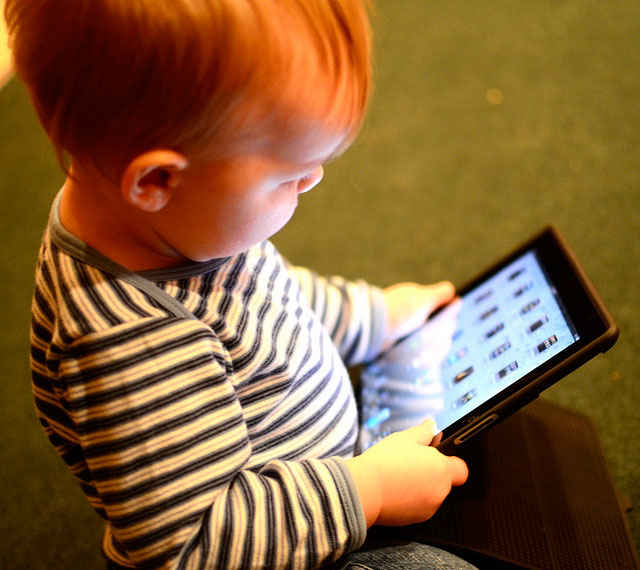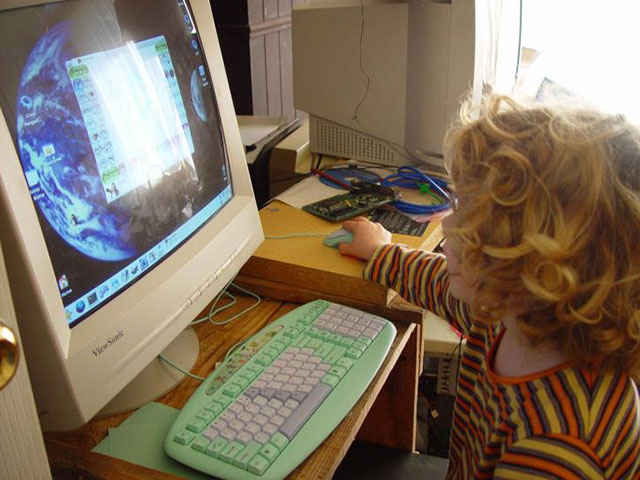Is Technology Bad for Kids?
Steve Jobs reportedly restricted his kids from accessing the iPad. Were his fears of the ill effects of tech unfounded? Is tech good for kids or does it cause more harm? Read on...

Have you met five-year-old Mumbai-based pre-schooler Moksha Jain? She can’t get through a single meal without her tablet playing cartoons in front of her. Or ten-year-old Bangalore-based Ethan D’sa, who has a cell phone, tablet AND laptop and can always be seen on either one or all of those attention-seeking gadgets at any given time of the day? Kids today are battling an addiction of sorts. Tablets, smartphones and gaming devices such as Nintendo DS, Wii and PS3 are gifted to them not only as a means of entertainment, but also to buy that little bit of momentary peace of mind for the adults. Basically, a “shut-up toy” (an actual industry term) to occupy them during daily routines such as errands, car rides and eating out. It is said that the smarter the toy, the lesser challenged the kid. Everything is done at the click of a button or rather a tap of a screen nowadays. Even easy access to information could potentially be spoiling the younger generation, with spoon-fed solutions from Google and an abundance of information of the wrong kind. But is exposure to technology all bad? After all, we at Digit live and breathe technology 24/7, and we can’t possibly condone something that’s obviously detrimental. Rest assured, as always there is a flipside and in this case, an upside. There is enough research on the pro-technology side that suggests exposure to technology is, in fact, good for children. Take the most cited example of gaming. Research suggests gaming aids in multi-tasking, analytical ability, decision-making and self-control. Think of the first generation that grappled with embracing technological innovations like the telephone or television. It did take getting used to.
 Survey
SurveyMany of you adults reading this would’ve had TV as a part of your life growing up. Your formative years weren’t ruined and you didn’t turn out so bad, did you? Perhaps there only needs to be a bit of acclimatisation on our part. Perhaps it’s just a simple case of dealing with change, establishing boundaries and making the technology work for us the way we want it to. Either way, the question of whether tech is good for kids is not an easy one to answer. Both sides have to be looked at and in this article we will be doing just that. Let’s play the devil’s advocate and start with the bad…
The problem with 21st-century tech
Tech overuse, in particular, smartphone and tablet overuse, among toddlers according to many researchers may stunt social-emotional and language development and problem-solving skills. For quite some time now kids-specific tablets such as Mosti’s Chhota Bheem Tab or Inte’s Eddy Tablet have been available for children, and this huge market exists for a reason. A recent survey by PBS reports that 70 percent of parents polled allow their toddlers and young kids to use their iPad. Now couple that statistic with this one: eighty percent of a child’s mental growth happens in its first two years. Scary, huh? Should you be trusting a tablet during such a crucial stage of a child’s development? Ok, so your 2.5-year-old has learnt the alphabet by himself, can phonetically sound them, put them in order and even count to 30, but can he use the letters in any type of linguistic context? Does he understand what these numbers and alphabets actually mean? Your pride may be based on the fact that you could do none of these things at his age, but all he’s doing is rote learning, that is, memorising by repetition. Then again, isn’t that how all kids learn in the beginning? Evidence suggests that well thought out apps, games and television shows such as Sesame Street can actually help vocabulary and reading comprehension, but only once children are much closer to school age. While the level of engagement is extremely high, thanks to the tech being inclusive and making them feel like their voice is being listened to, these gadgets can’t replace the benefits of human attention.
Sorry Siri and Dora the Explorer.
Multi-tasking Moghuls
It’s not uncommon to find children playing a game on their tablet while watching a programme on T.V. Or older kids surfing the internet while texting and listening to music. While we applaud their ability to multi-task and make rapid decisions, we can’t overlook the fact that kids doing this regularly have trouble focusing on schoolwork and homework or seeing complex tasks through to completion. There’s plenty of research telling us how and why concentrating on one task is better than doing 2-3 things at a time. If your kids are eating while watching television or movies on their gadgets, they’re not paying complete attention to either task.
Are they videogames or mind games?
Speaking of the ability to make rapid decisions, let’s talk about video games and gaming apps for a bit. According to an AC Nielson survey, by the time a child finishes primary school, s/he will have already witnessed 8,000 murders and 20-25 acts of violence each hour. Yes, this is children-targeted media we’re talking about. Also, simply because the title has the word “game” in it, doesn’t immediately qualify it as such for everyone. The reasons for the age rating on games are the same as those for movies – violence, nudity, gore, drug use and profanity. You wouldn’t let your kid watch an R-rated movie, why would you allow her to play games targeted at an older group?
The damage continues…
Each minute spent playing games on a gadget is taken away from the time the child could have been playing with other kids her age, learning in the process, how to resolve conflicts and take on leadership roles. A study published in the October 2014 issue of ‘Computers in Human Behavior’ revealed that digital media decreases children’s ability to read other people’s emotions and social cues. Participants, 11-12 years of age, were asked to recognise human emotions from a series of photographs and muted videos. Half of them were then sent to a camp to complete traditional camping activities such as hiking, archery and learning about nature. Access to their gadgets was taken away, while the other half went about as usual with their day on digital media (which on a typical school day averaged four-and-a-half hours of screen time). The post-test revealed that the campers showed marked and significant improvement in their ability to guess emotions, while the gadget-toting group showed only slight improvement, revealing just how important face-to-face interactions are.
Effect on physical well-being
Tech’s negative effect on physical health is irrefutable. Not only is the apple of your eye ruining his vision by not blinking, constantly focusing on the gadget (thereby making it hard to eventually adjust to viewing distances) and sitting in pitch dark with the bright screen, he’s also increasing his chances of being overweight and unhealthy by not getting enough exercise and sunlight. Sleep problems due to exposure to light emitted by gadgets right before sleeping and orthopaedic complications are other issues that could also negatively affect your child’s daily life and simply can’t be ignored.
We should just hide it all away from them, right?
Isn’t it wise then to give your child a Play-Doh set rather than an iPad? It only makes sense right, considering the former will help unleash your toddler’s creativity compared to tech consumption on the iPad? Not really. Why? Read on.
Benefits of tech
Think back to many years ago. Inventions that were new back then – be it the telephone, radio or even the internet – were plagued with concerns about their evil effects on users, but aren’t even given a second thought now. Change is scary. Present day tech may not be childhood as you know it but like with everything else, it takes some getting used to. With time, it gets easier as you learn about the virtues of its introduction. Let’s look at some of these benefits.
Image Courtesy: Tia Henriksen
Goodbye modem. Hello Wi-Fi
It’s mind-blowing how much progress we’ve made, especially in the fields of science and tech. Today’s kids will never experience the frustration of 90s kids. We grew up around landline phones and desktop computers that would take forever to start. And don’t even get us started on modems that would kick us out of chatrooms the moment the landline phone was picked up. Tech has taken great strides even in terms of how much processing power gadgets of today have. Try this on for size: You’d need approximately 850 old Apple computers to equal the power of a single iPhone – something that can fit in the palm of your hand.
Let the games begin
Researchers say that the brain is ever-changing and not fixed so interacting with a device may make your kid’s brain sharper. It’s common knowledge that playing action games improves hand-eye co-ordination, but did you know that gaming also aids in multitasking, decision making and self-control? As per a study published in December 2013, there’s “a robust positive association between cortical thickness and video gaming duration”. Furthermore, improvements in higher-level cognitive functions such as task switching, working memory and reasoning were associated with improvements in a strategic video game. This study was supported by an experiment led by Adam Chie-Ming Oei and Michael Donald Patterson at the Nanyang Technical University of Singapore. The duo studied different types of games – spanning life simulation games (e.g. Sims), object matching games (e.g. Bejeweled) and action games/finding hidden objects (e.g. Hidden Expedition) – and their positive impacts on different types of cognitive skills. The researchers identified an improvement in visual search skills, which were sharpened through games that required matching and spatial memory capabilities. Also, the ability to track multiple objects improved via action games. Soon, we’ll be seeing games being prescribed for clinical treatments of ADHD or even brain injuries. If the game is well-designed enough, its benefits can surpass even the advantages of reading books and consuming other forms of media.
What about their social skills, their health?
Isn’t being in a zombie-like state putting a dampener on their social skills? Not if adults involve themselves in the child’s gaming activity. It is a commonly accepted fact that team activities help develop social skills and self-esteem. It’s the same with gadgets. Kids get a boost in confidence when they’re able to show off their knowledge of how gadget controls work and act as teachers to adults showing them, for example, how to get around certain obstacles like skipping an ad to get to a video quicker. Children now have the never before seen ability to connect with other kids from all over the globe, giving them access to other cultures through cartoons like Peppa Pig and Dora the Explorer. Their minds are expanded thanks to different points of view and ways of seeing the world even before they’re 10. Parents encouraging kids to use interactive media together with them soon learn of the many opportunities their toddler comes across to move their bodies, dance and exercise. Barely 6 years of age, Caytlin Fernandes can go to YouTube, look for choreography videos for her favourite songs and imitate the steps within a few minutes. Exergaming, i.e. games that require players to perform physical activities in order to play a game (Dance Central, Just Dance) are just as effective at combining the enthusiasm for gaming with exercise. Physical activity in this form ranges from dancing and aerobics to martial arts and a variety of sports moves giving them a host of benefits such as facilitating family bonding, cardiovascular exercise, sensory motor learning and improved cognitive performance in the bargain.
Will preventing access to tech hinder my child’s future?
A certain section of society believes that in an increasingly computerised world, if their young’un are deprived of gadgets at a younger age, they’ll be left behind. While it’s true that giving kids access to computers is akin to giving them an opportunity of a head start in learning how to use them, let’s not forget that by the time he or she graduates from college, tech such as iPads that they’ve painstakingly learnt to use during school will be obsolete by then. On the bright side though, this means that children exposed to all that tech will be able to more easily adjust to newer inventions than kids who gave it the cold shoulder. Already there are reports about Finland scrapping cursive handwriting from their curriculum and replacing it with keyboard typing. Then there are mass movements aimed at kids such as code.org which operate from the belief that coding is the new literacy.
Michael Calce got his first computer at the age of six. As a 15-year-old, he went on to be known by the online name “Mafiaboy” when he launched a massive cyber-attack. Today, Michael works as a consultant for companies trying to protect their online systems from security breaches. Kids below the age of seven can easily pick up foreign languages so why can’t they learn to code? iPad games such as Kodable teach kids as young as five years old programming fundamentals. If they display a passion for understanding how apps and web sites work, those are early signs that a career in programming could be on the cards at a later stage. Think about your own chosen profession and how it relates to your early life ambitions. If you assemble computers for a living, you probably enjoyed deconstructing and building things as a child. One may argue that exposure to digital media may be helpful only to those pursuing a career in tech, but the thing is it’s all around us, and not going anywhere so we might as well get our kids to jump onto the tech bandwagon, if not for anything else than to prevent goof-ups that could cost them a job.
Balance is important
What would we do without tech? Nothing apparently. When was the last time you dialled a contact number from memory or calculated a discount without the help of a calculator? While calculators are great in a pinch, you don’t want to be suckered into using any device that threatens to leave you mentally dependent on it. So let’s not deprive the little one the knowledge of the basic ways of surviving just in case technology fails them when they need it the most.
Header image courtesy: Lucélia Ribeiro


